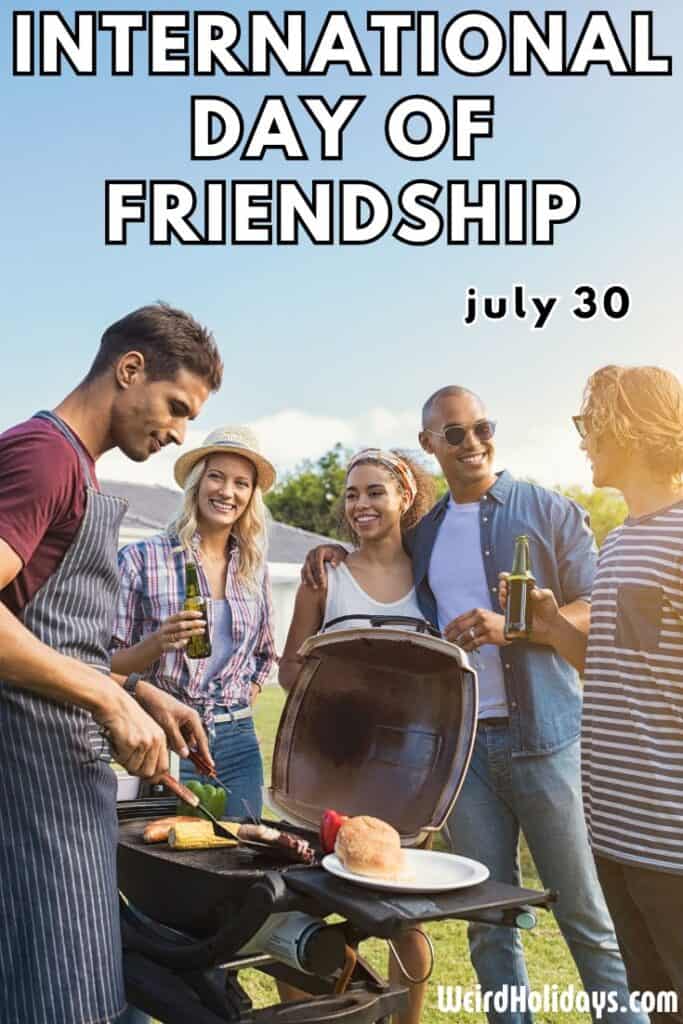International Day of Friendship (July 30)

One weird holiday on July 30 is International Day of Friendship. Check out the other quirky days in July!
International Day of Friendship is a global observance that emphasizes the role friendship plays in fostering peace and building bridges between communities.
The United Nations officially proclaimed this day with the understanding that friendship between peoples, countries, and cultures can inspire peace efforts and build bridges among communities.
This article explores the origins of this important day, examines the role of friendship in societal cohesion, and offers creative ways to celebrate the enduring bonds of friendship.

When is the International Day of Friendship?
International Day of Friendship takes place each year on July 30th.
Who Invented International Day of Friendship?
International Day of Friendship was not exactly “invented” by a single person or entity but rather proclaimed by the United Nations General Assembly in 2011.
The idea was inspired by a proposal from UNESCO, which highlighted the importance of friendship as a noble and valuable sentiment in the lives of human beings around the world.
This proposal was influenced by the Culture of Peace Initiative, which recognizes the links between friendship and efforts towards building a culture of peace.

The Origins of International Day of Friendship
The International Day of Friendship, celebrated globally on July 30th, was officially proclaimed by the United Nations General Assembly in 2011. This observance was rooted in the core mission of promoting friendship and solidarity among all human beings, regardless of their background or nationality.
The idea of dedicating a day specifically to celebrate friendship was inspired by the initiatives and efforts of several international and community groups that recognized the significance of friendship as a valuable part of human happiness and global harmony.
The UN’s decision to formalize this day was influenced by the broader goals of its educational and cultural agency, UNESCO. UNESCO had been promoting a “Culture of Peace,” which emphasizes the importance of fostering peaceful relations. This framework encourages actions that cultivate respect, acceptance, and mutual understanding among people—a natural alignment with the ideals of friendship.
The roots of the day can also be traced back to initiatives by individuals and groups around the world who championed the role of friendship in fostering peace and community cohesion. One notable contribution was from Dr. Ramon Artemio Bracho during a dinner with friends in Paraguay in 1958, which led to the creation of the World Friendship Crusade.
This organization campaigned for decades to promote a global culture of friendship, and its efforts significantly influenced the UN’s decision to establish an International Day of Friendship.
Through the proclamation of this day, the United Nations aimed to integrate the simple yet profound values of friendship into everyday dealings between peoples and countries, supporting the organization’s broader goals of international cooperation and peacekeeping.
The day serves as a reminder that friendship between peoples, cultures, and individuals can inspire peace efforts and build bridges among diverse communities.

Friendship and Its Role in Social Cohesion
Friendship is a fundamental human need that plays a vital role in promoting overall societal health. Studies have shown that having close bonds can reduce stress, increase happiness, and even prolong life. More broadly, friendships that cross national and cultural divides can promote international understanding and cooperation.
- Psychological Benefits: Friendships contribute significantly to personal development and happiness. They provide support, can help to boost one’s self-esteem, and offer a sense of belonging and security.
- Social Impact: On a larger scale, friendships can drive social integration and promote harmony among diverse groups. This is particularly important in multicultural societies where social cohesion is crucial for national stability.
- Promoting Peace: At the international level, cross-cultural friendships can lead to greater empathy and understanding among different communities, which are essential for conflict resolution and peacebuilding.
Some people are able to build friendships as children that last their entire lives. Others form close relationships during their adult years. Sometimes you know instantly you want to be friends, but other times it takes a while to develop that close bond.

Celebrating International Day of Friendship
Celebrating this day provides a unique opportunity to reflect on the value of our friendships, reach out to old friends, and bridge the gaps between different cultures. Here are some ways to commemorate this day:
- Connect with Friends: Reach out to your friends; whether through a simple phone call, a video chat, or a handwritten letter. Taking the time to reconnect can strengthen bonds and create lifelong memories.
- Show Your Friend You Care: Show your friends how much you care and value them with any of these ideas.
- Cultural Exchange Gatherings: Host a gathering or a party where people can share foods, games, and traditions from their own cultures. This not only celebrates friendship but also enhances understanding and acceptance.
- Community Service: Organize or participate in community service activities. Volunteering together can be a powerful way for people to build connections while giving back to the community.
- Public Seminars on Friendship and Peace: Attend or organize seminars and workshops that focus on the role of friendship in promoting peace and understanding across different cultures.
- Art and Music Celebrations: Participate in or organize events that use art and music to celebrate friendship. These universal languages can help convey messages of peace and friendship across different audiences. You can also form social groups with friends who have mutual interested, such as writing.
- Social Media Campaigns: Use social media platforms to share messages of friendship and unity. Posting pictures with friends, sharing stories about cross-cultural friendships, or even just spreading positive messages about the importance of peace and togetherness can inspire others to do the same.
- Educational Programs in Schools: Schools can organize programs that encourage students to make friends from different backgrounds and teach them about the values of inclusivity and diversity.

International Day of Friendship is more than just a day to celebrate those we care about—it’s a reflection of the larger global tapestry and the potential of friendships to bridge divides.
By fostering connections that transcend societal, cultural, and international boundaries, we can contribute to building a more peaceful and harmonious world. Let us cherish and nurture our friendships, for they are the threads that weave the fabric of a more compassionate society.
Pin it!
Share this post about friendship on Pinterest!

